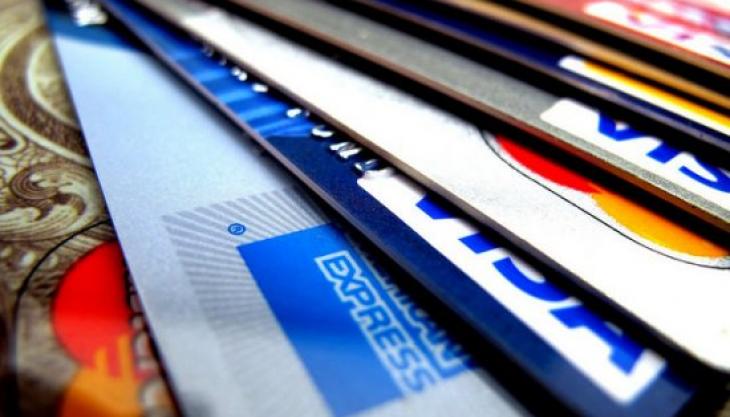Credit Card Debt Much Higher Than Surveys Report – More Than $15,000 per Household
Submitted by Rachel R on Tue, 09/29/2015 - 10:51am

Credit card debt can quickly grow out of control
Image Source: Flickr User frankieleon
Statistics can be a tricky thing. Many news reports and articles list average American household credit debt between $5,000 to $7,000. The amount reported depends on which source the author cites, but neither seems like a remarkable level of debt. The Federal Reserve tracks data, and the most recent report lists an average $7,327 of credit card debt per household. But this number is flawed because it takes into account all households, even those that don’t carry credit card debt. NerdWallet tweaked this data to calculate the debt among only households that carry debt.
Credit card debt climbs to more than $15k
Based on NerdWallet’s assessment, when you consider only those households that have credit card debt, the average owed is $15,706 per household. This is more than double the Federal Reserve number but is also more accurate. Households with a $0 credit card balance may be in that state for any number of reasons. They may pay off their debt in full and never carry a balance over – but what’s also likely is that those households have no credit cards at all. Many Millennials choose to stick with debit over credit and those with poor credit may not have any cards except debit or prepaid.
How long does it take to pay off $15k in credit card debt?
The Federal Reserve says the average credit card interest rate is 12%. With that in mind, to pay off a $15k balance over five years, you would have to refrain from using the cards again and would pay more than $330 every month. This would result in paying a total of $20k with more than $5,000 of interest. If you could only pay $200 a month, it would take nearly 12 years to pay off this debt and increases the interest to almost $13k – nearly the amount of the original debt. And if you can only pay $165 a month, the time to pay off extends to 20 years with $24k in interest on top of the $15k original balance.
How do payments escalate with higher interest rates?
Under the same scenario, a $15k balance at 18% interest increases payments to:
- A five-year payoff would increase payments to $381 to $350
- The 12-year payoff would increase to installments of $260 from $200
- The 20-year payoff would bump installments to $231 from $165
Consider the same scenarios with a subprime interest rate of 25% and you see these payments:
- The five-year payoff would increase payments to $440 from $350
- The 12-year payoff would increase to installments of $331 from $200
- The 20-year payoff would bump installments to $315 from $165
Credit card debt collectors are aggressive
If you can’t pay the amount owed, you can expect your credit card issuer to be prompt and active with collections. And if you have a subprime interest rate credit card, you can expect aggressive collections. Once a credit card goes into debt collections, you can expect your balance owed to increase drastically. You will be hit with late fees every month a payment isn’t sent. And if you’ve maxed your available credit – which is typical of collection accounts – you can also be hit with a monthly over-limit fee. This can escalate rapidly, and when you add on collection and attorney fees, your balance can skyrocket.
Bankruptcy offers immediate discharge of credit card debt
Credit card debt is 100% dischargeable in Chapter 7 bankruptcy. Because it is unsecured debt, credit cards can be wiped out in Chapter 7 which takes just a few months from start to finish. Plus, once the bankruptcy petition is filed, credit card debt collectors must immediately stop contacting you. If you are crushed by credit cards, medical bills, and other unsecured debts, Chapter 7 bankruptcy offers the financial fresh start you deserve.
Contact the Law Offices of John T. Orcutt today. Call +1-833-627-0115 for a free North Carolina bankruptcy consultation at our offices in Raleigh, Durham, Fayetteville, Wilson, Greensboro or Wilmington.
Sources:
Debts Hurt! Got debt? Need help? Get started below!
Serving All of North Carolina
- Bankruptcy Attorneys Raleigh NC (North)
- Bankruptcy Attorney Fayetteville NC
- Bankruptcy Attorney Durham NC
- Bankruptcy Attorneys Wilson NC
- Bankruptcy Attorneys Greensboro NC
- Bankruptcy Attorneys Southport NC
- Bankruptcy Attorneys Wilmington NC
Bankruptcy Attorneys Raleigh NC (North)
6616 Six Forks Rd #203 Raleigh, NC 27615 North Carolina
Tel: (919) 847-9750

Bankruptcy Attorney Fayetteville NC
2711 Breezewood Ave Fayetteville, NC 28303 North Carolina
Tel: (910) 323-2972

Bankruptcy Attorney Durham NC
1738 Hillandale Rd Suite D Durham, NC 27705 North Carolina
Tel: (919) 286-1695


Bankruptcy Attorneys Greensboro NC
2100 W Cornwallis Dr. STE O Greensboro, NC 27408 North Carolina
Tel: (336) 542-5993

Bankruptcy Attorneys Southport NC
116 N Howe St. Suite A Southport, NC 28461 North Carolina
Tel: (910) 218-8682

Bankruptcy Attorneys Wilmington NC
116 N. Howe Street, Suite A Southport, NC 28461 North Carolina
Tel: (910) 447-2987
